Burning Money, Anxiety, and a Trillion-Dollar Ambition: Why is OpenAI Launching Atlas?
![]() 10/28 2025
10/28 2025
![]() 500
500
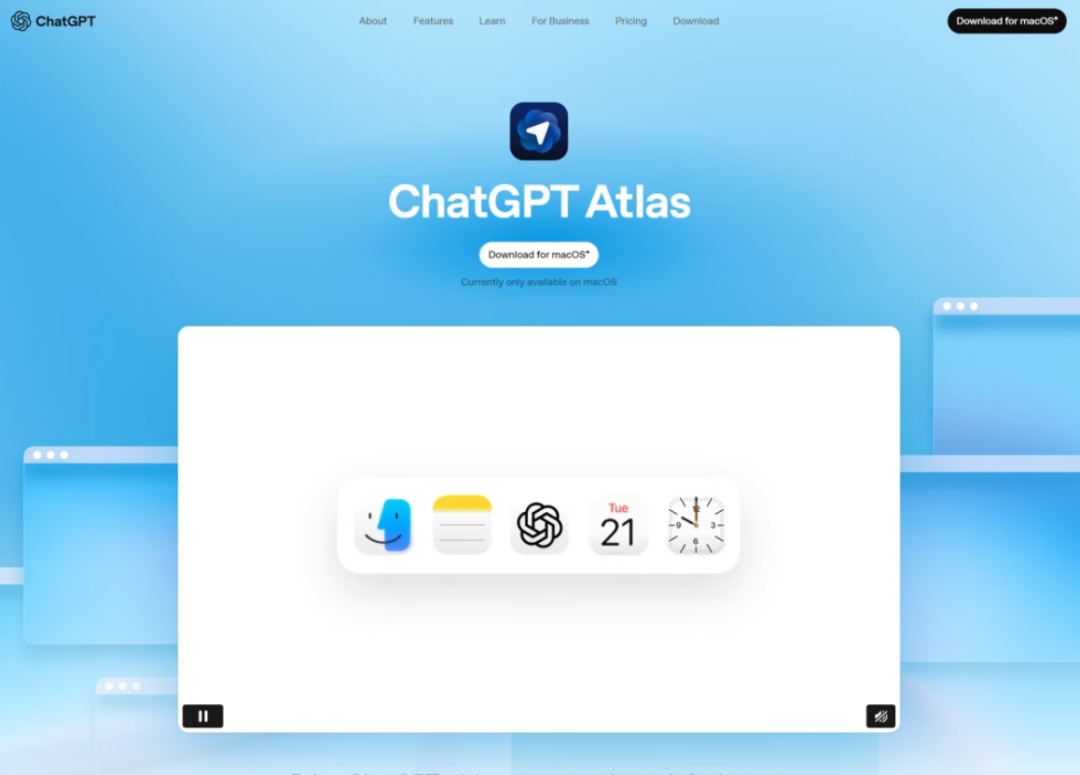
Has Atlas Really Disrupted the Status Quo?
OpenAI has truly rolled out the 'ChatGPT browser,' named Atlas—a bold moniker inspired by the Greek titan who carries the world on his shoulders.
By choosing this name, OpenAI's ambition is clear: they believe AI has become an indispensable pillar in the human world, much like the titan himself.
Its emergence has stirred significant waves in the AI landscape, with Google perhaps being the most restless. Sam Altman described it as a 'once-in-a-decade opportunity to redefine browsers,' and the capital markets responded honestly: on the launch day, Google's stock price dropped by 2.37%, at one point falling by 4% during intraday trading, wiping out nearly $100 billion in market value.
Over the past decade, Chrome has served as the standard gateway to the internet for many. Atlas's core selling point lies in its deep integration of the powerful ChatGPT, which can be simply understood as Atlas = Chrome + ChatGPT.
It is no longer just a browsing tool but seamlessly incorporates a conversational AI assistant into the browsing experience, achieving a level of 'memory' capability and 'agent' mode that traditional browsers struggle to match.
However, not everyone can experience it immediately.
Atlas currently only supports the macOS system, with an additional requirement: it must be a Mac equipped with an Apple Silicon chip. Older models with Intel processors are not compatible. What about Windows, iOS, and Android versions? They are not yet on the agenda.
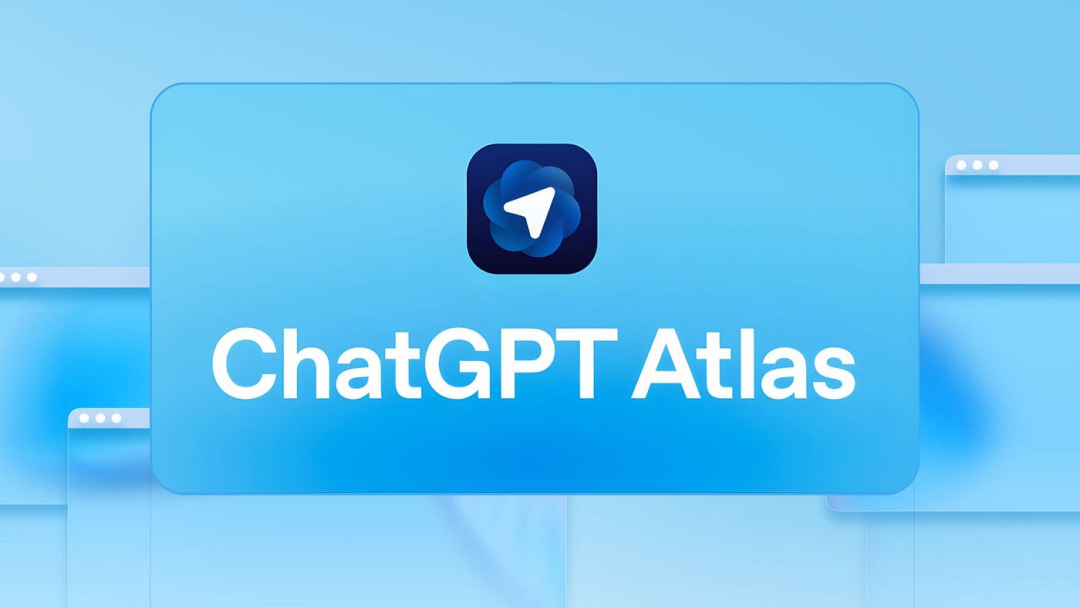
Image Source: Internet
The good news is that all ChatGPT users, including free users, can access it. If you're willing to set it as your default browser, you can even enjoy a 7-day free trial of the premium membership. Of course, the core 'agent mode' is exclusively available to ChatGPT Plus, Pro, and Business users.
So, what is the real experience of Atlas like? Can it disrupt the long-standing browsing habits of Google Chrome users? What grand strategy is OpenAI pursuing behind this?
How Does Atlas Disrupt User Browsing Habits?
In initial overseas user experiences, ChatGPT Atlas has showcased impressive traits.
1.1 Seamless Migration: Luring Chrome Users Away
From download to login, Atlas provides a smooth user onboarding process. It proactively asks whether to import data from the local Chrome browser. With full support for Chrome's plugin ecosystem, users can seamlessly transfer their search habits and extension tools with a single click.
Built on the same Chromium engine as Chrome and Edge, it ensures excellent compatibility and a consistent browsing experience, significantly reducing the learning curve for users.
Notably, in 2024, OpenAI poached several vice presidents from Google's core Chrome team, including Ben Goodger, a veteran who contributed to the creation of both Chrome and Firefox. This provides a solid foundation for optimizing the browser's underlying architecture.
1.2 Deeply Integrated AI Conversational Experience
The core enhancement of Atlas lies in its deep integration of ChatGPT into the browsing workflow. Users no longer need to switch between different pages; they can directly converse with ChatGPT on any tab.
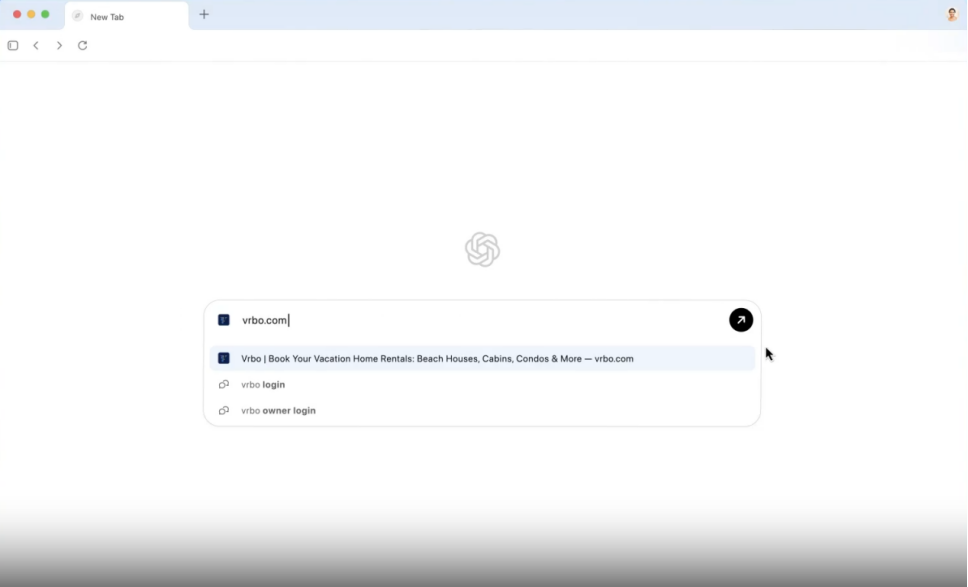
Image Source: Internet
In particular, the Cursor Chat feature allows users to quickly select a segment of text and directly instruct ChatGPT to edit, rewrite, or polish it. This is highly efficient for daily writing, report drafting, and academic paper reading, enabling 'selection-based editing' and doubling writing efficiency.
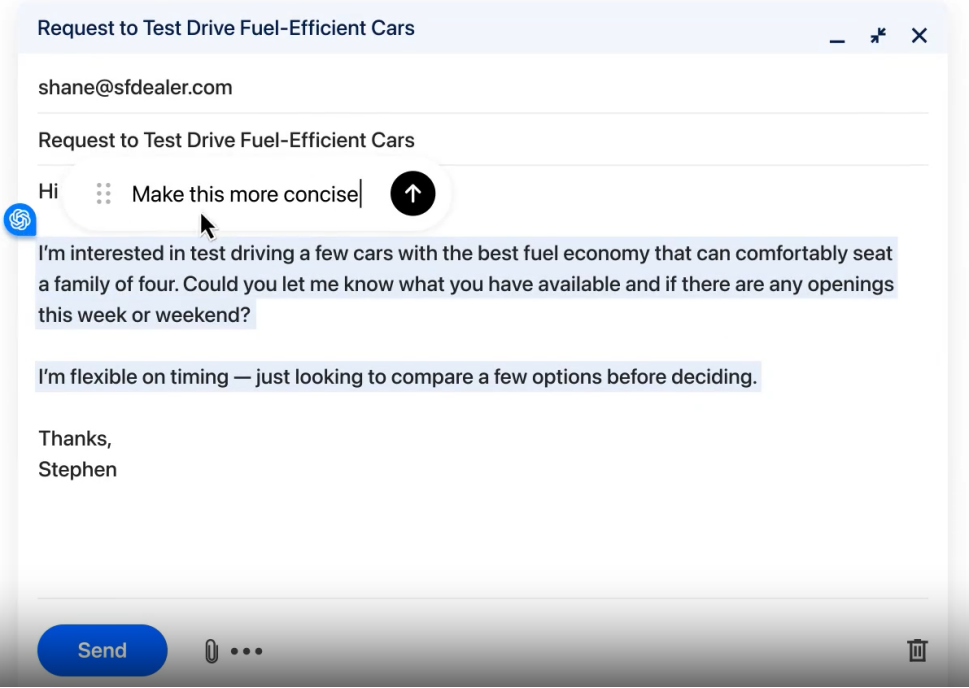
Image Source: Internet
1.3 Intelligent Sidebar
The sidebar design is one of Atlas's highlights. By clicking the 'Ask ChatGPT' button, users can open the ChatGPT sidebar on the right side of any page.
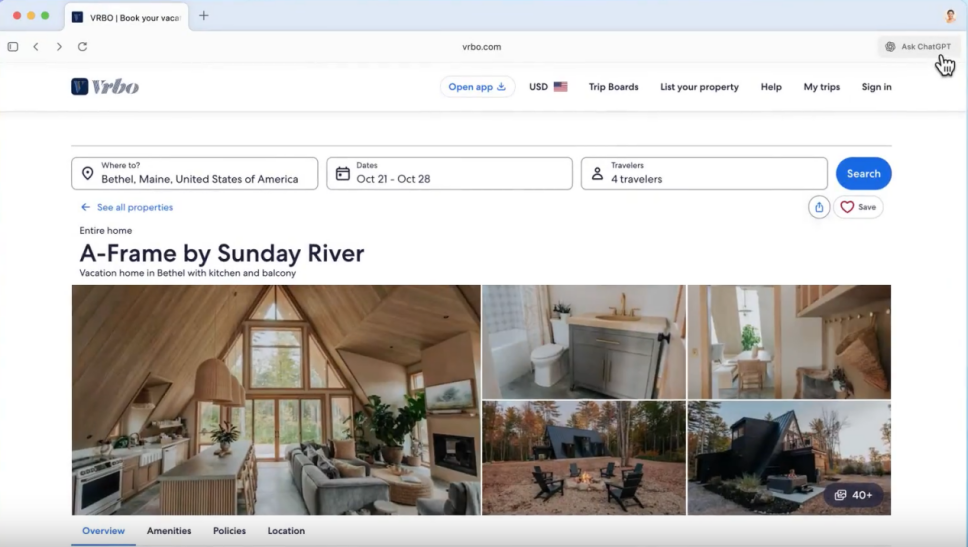
Image Source: Internet
ChatGPT, with contextual understanding, can read the detailed content of the current page and perform summarization, explanation, or handle specific tasks.

Image Source: Internet
Like a readily available consultant, it can instantly respond to requests such as 'Summarize this article for me' or 'What are some good hiking routes nearby?'
This split-screen display mode allows users to view the original webpage while engaging in multi-round conversations with ChatGPT, fundamentally transforming the traditional single-search-and-jump experience.
1.4 Autonomous Agent Mode
A more cutting-edge exploration is the Agent mode, which enables ChatGPT to autonomously complete multi-step tasks within the browser, such as conducting research, scheduling meetings, or placing online orders.
For example, a user can instruct it, 'I'm taking my family to the beach tomorrow. Please help me prepare beach supplies.' The AI will then request control of the browser and proceed step by step. However, this feature is currently prioritized for Plus/Pro subscribers.
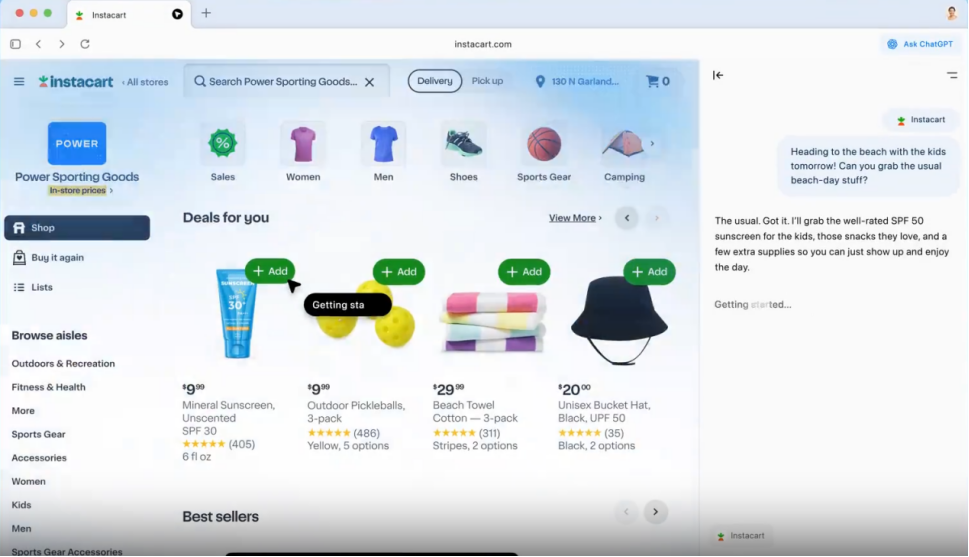
Image Source: Internet
1.5 Proactive Memory Function
Meanwhile, Atlas's memory function is forward-looking, allowing ChatGPT to remember the context of websites users have visited.
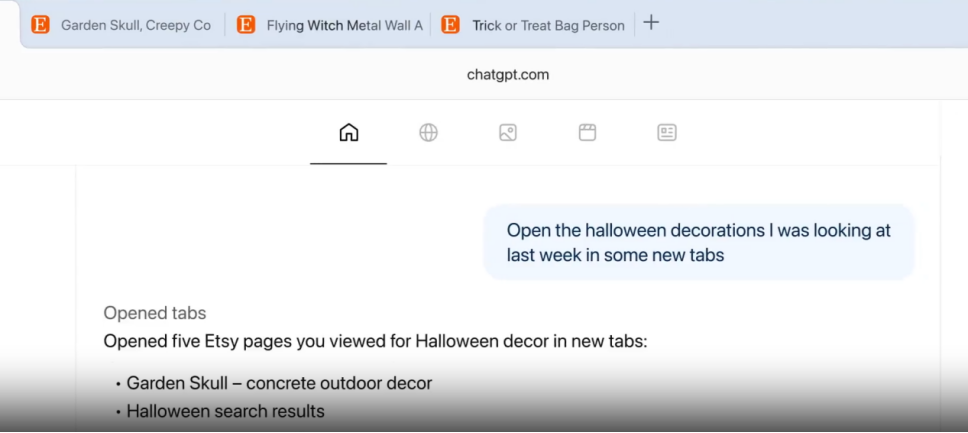
Image Source: Internet
For instance, you can ask, 'Find all the laptops and mobile phones I browsed last week, organize them by brand and price range, and help me analyze which models are the most popular and have the largest discounts.' This initially realizes the vision of an 'AI personal assistant'—it remembers your behavior and can complete tasks on your behalf based on this information.
From actual user feedback overseas, the response has been quite positive. One user said, 'I downloaded it right after the launch event,' and commented, 'The Agent experience seems to outshine Chrome's. After using it, I don't want to switch back.'
So, can Atlas, with such ambitions, truly shake Chrome's dominance?
Atlas Still Has Significant Room for Improvement
To be honest, Atlas does showcase some innovation, but it's still too early to challenge Chrome's position. It still has obvious limitations in several aspects.
2.1 Questionable Efficiency and Practicality of the Intelligent Agent
While the Agent mode is conceptually advanced, its actual efficiency is questionable. Tests by netizens show that instructing Atlas to find and delete all marketing emails from a specific website in Gmail and unsubscribe took nearly 10 minutes, which is slower than manual operation.
More importantly, when handling sensitive websites like banking or email, Atlas requires users to keep the current page visible at all times. Once the tab is switched, the process immediately interrupts.
This design, combined with its inherently slow processing speed, makes the Agent mode rather impractical in scenarios involving personal information. Currently, this feature is only available to ChatGPT Plus/Pro members, further limiting its adoption.
2.2 Product Stability and Performance Need Optimization
According to a test report published by self-media blogger Lang Hanwei on October 22, 2025, while Atlas can complete basic operations in high-frequency user tasks like text summarization, video summarization, email handling, and social media-related tasks, its success rate significantly declines when faced with slightly more complex tasks.
Additionally, the report points out instances where it completely misunderstood requirements, experienced 'AI hallucinations,' and provided false information. The most prominent issue is its conservative behavior when dealing with copyright restrictions, preventing it from reading and summarizing video content.
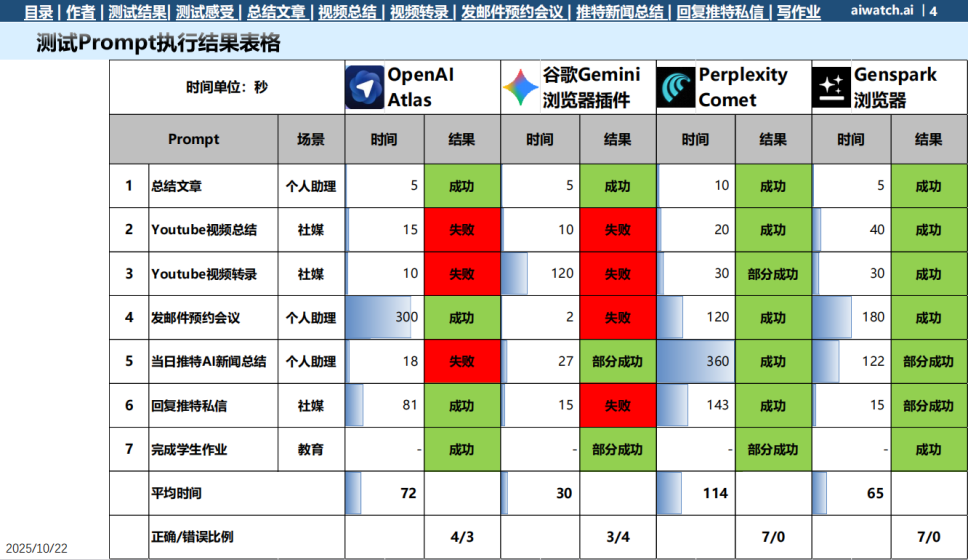
Image Source: Internet
Overall, Atlas is still a 'placeholder product' with significant room for improvement in terms of overall stability and completion capabilities.
Moreover, many users have reported browser lag issues, indicating high computer resource consumption. It is still in a testing phase that requires optimization.
2.3 Privacy and Security Risks Need Clarification
In terms of privacy and security, while Atlas's memory function is disabled by default and requires user authorization, the browser's memory capability itself remains a focal point of privacy controversy. Of course, in terms of privacy control, users can fully manage what ChatGPT can see and remember during browsing, including clearing specific page records, emptying the entire browsing history, or using 'Incognito Mode' for temporary browsing to maximize privacy protection.
At the security level, although OpenAI claims to have invested thousands of hours in 'red team testing' and implemented multiple safeguards for accessing sensitive websites—including prohibiting code execution, file downloads, and pausing operations for critical accounts to request confirmation—risks still exist.
Security researchers have found that AI agents may be vulnerable to phishing by malicious websites during automatic browsing, such as copying fake URLs to the user's clipboard, leading to accidental visits to phishing sites during subsequent pasting. Additionally, when AI agents make errors, such as booking the wrong flight or accidentally deleting documents, determining responsibility will become a challenge.
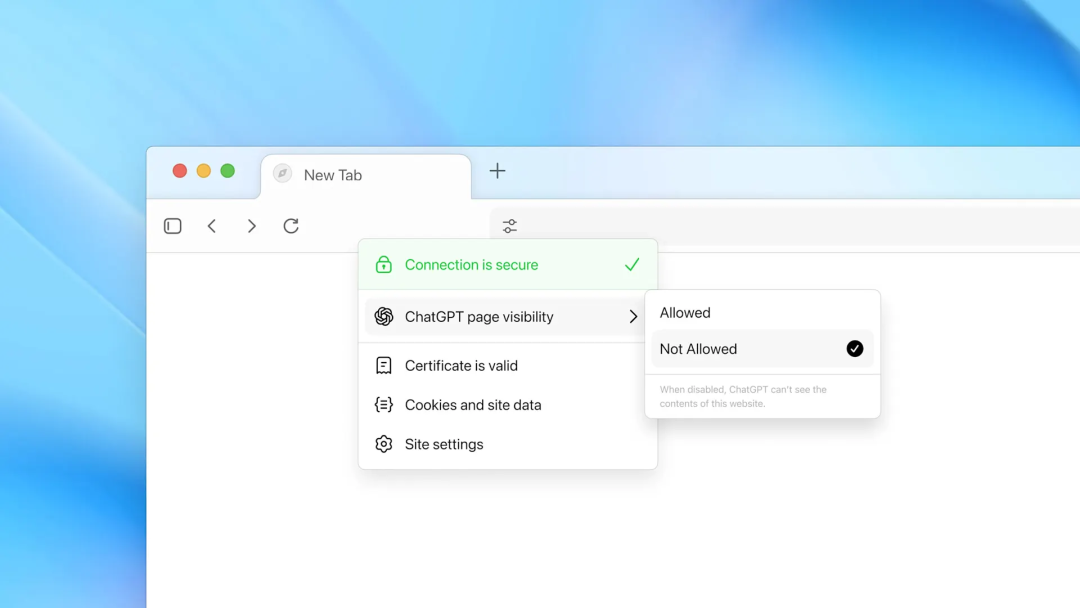
Image Source: Internet
2.4 Severely Limited Platform Coverage
Platform compatibility is indeed a significant weakness for Atlas. Currently, it only supports macOS devices equipped with M-series chips, which is not user-friendly for Windows users who hold a larger market share.
So, why did ChatGPT Atlas choose to launch on macOS first? Many overseas users have this question.
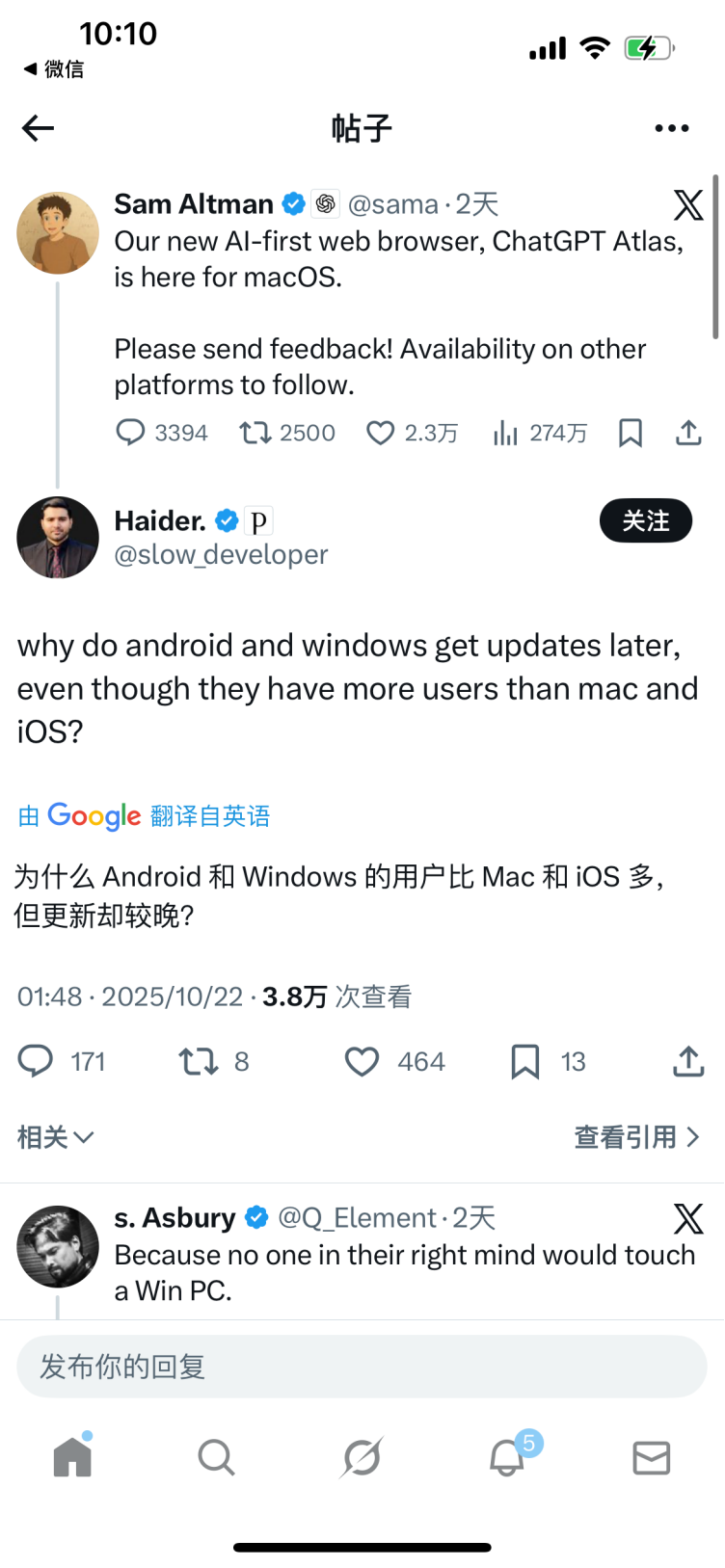
Image Source: Internet
From a technical perspective, all Apple Mac computers use self-developed Apple Silicon chips, providing a unified hardware architecture that allows OpenAI to focus on deep optimization and ensure a smooth and high-performance AI experience for all Mac users.
In contrast, the Windows system must contend with various hardware combinations from Intel, AMD, and even Qualcomm, significantly increasing development complexity.
More importantly, the user demographic alignment. macOS users, particularly those in creative, development, and technical fields, are often considered 'early technology adopters.' They are more willing to try innovative products like Atlas that disrupt traditional browsing experiences and can provide valuable feedback during the product's early development stages.
At the same time, this user group exhibits a higher willingness to pay, which is crucial for features like Agent mode that require ChatGPT Plus or Pro subscriptions.
So, does Atlas have the potential to surpass Google in the future? The author believes there is room for imagination.
It must be acknowledged that this is only the first version of Atlas, and various issues are inevitable. The inherent instability and complexity of intelligent technology are precisely part of its evolutionary process.
Objectively speaking, Atlas represents a fresh starting point in the AI browser landscape, with a development path fundamentally different from traditional browsers that simply add AI functionalities. Built on the Chromium kernel and adhering to existing web standards, its core lies in productizing the new technological paradigm of 'AI operating the browser.' Traditional browsers lack technical accumulation in this area, and their market positions may face challenges in the long run.
Of course, the journey of exploration for AI browsers did not begin with Atlas.
The Comet browser launched by Perplexity has already garnered attention with its powerful answer engine and diverse Agent skills. To some extent, Atlas can be seen as a combination of Comet and native ChatGPT capabilities. It relies on OpenAI's powerful model capabilities and maintains a simple and focused design.
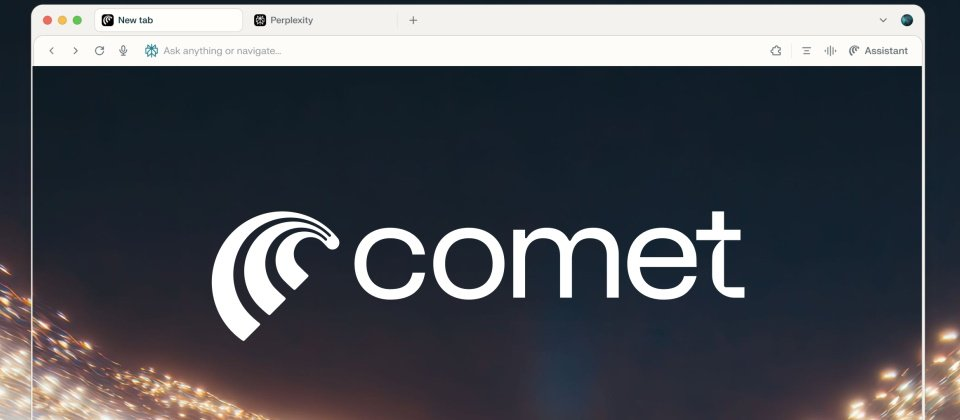
Image source: Internet
However, changing deeply ingrained user browsing habits and capturing market share from Chrome and Edge still require the test of time.
Regardless, the release of Atlas marks OpenAI's firm commitment to entering the browser arena. Nowadays, no one doubts that browsers are evolving into intelligent companions capable of proactively solving problems and handling tasks.
While Atlas may not replace Chrome overnight, it, along with numerous competitors, is ushering in a new era of 'AI-native' internet browsing.
Looking at the industry landscape, established players have already launched counterattacks: Google, Microsoft, and Apple have deeply integrated AI capabilities such as Gemini and Copilot into Chrome, Edge, and Safari, respectively. Their strategy is clear: as long as the built-in AI functions are 'good enough,' most users will not easily switch browsers.
This 'AI browser war' has just begun.
OpenAI's anxiety is too evident.
OpenAI's foray into the browser market is essentially a strategic move to capture traffic and data.
When users become accustomed to obtaining AI-integrated answers directly in Atlas, the value of traditional search traffic entry points is significantly diminished. This new 'answers-as-a-service' model is naturally suited for embedding native ads, product recommendations, and paid content, opening up new revenue streams for OpenAI.
The commercial value of browsers as internet gateways has long been validated. The most basic model is search revenue sharing—each search conducted on a new tab page generates income for the browser.
However, Atlas's potential extends far beyond that: when AI assistants help you book hotels or purchase goods, the platform can take a commission. More advanced capabilities, such as enhanced memory functions, faster response speeds, and team collaboration, can be bundled as value-added services and charged to enterprise and individual users.
The deeper strategic intent lies in data.
Vast amounts of user interaction data serve as valuable nourishment for training smarter AIs. By obtaining complete user behavior data through browsers, OpenAI can not only optimize existing models but also accumulate critical resources for achieving Artificial General Intelligence (AGI). Guiding 800 million ChatGPT users to its own browser means firmly grasping the traffic entry point.
According to Market.us predictions, the global AI browser market is set to soar from $4.5 billion to $76.8 billion within a decade. This blue ocean is indeed worth fully investing in.
Notably, Chinese tech companies have already made strides in this track (track): QQ Browser has integrated an intelligent assistant called QBot, Kuake has created an 'AI Super Search Box,' and Doubao has built a traffic closed loop through embedded AI functions. Although their paths differ, their goals align—using AI to reconstruct the browser experience and retain users within their own ecosystems to realize commercial value.
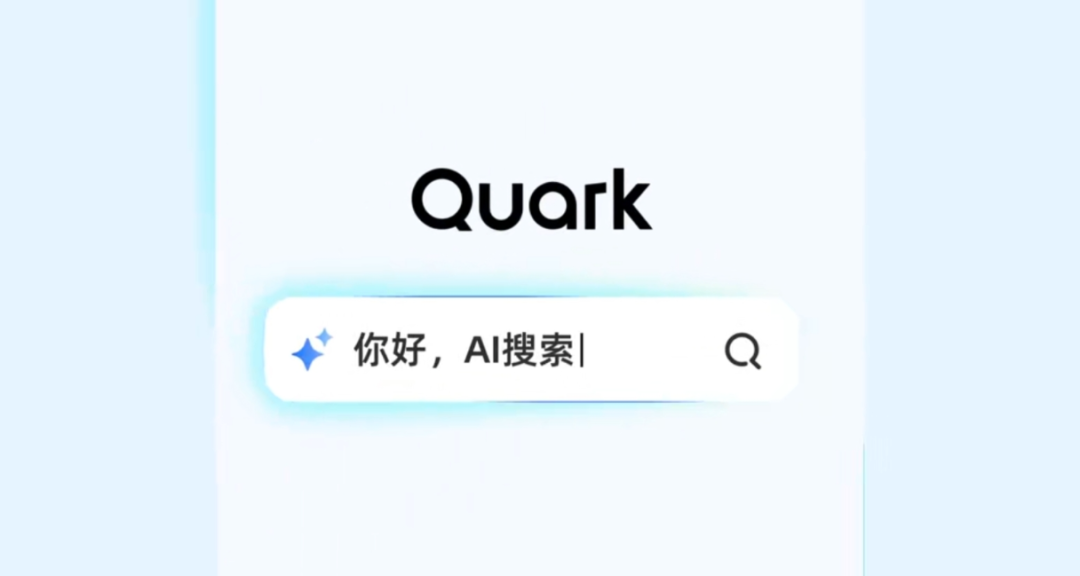
Image source: Internet
Despite differing implementation paths, the strategic goals of domestic giants and OpenAI are highly aligned: using AI capabilities to reshape the browser experience. As long as users stay within their own territories, finding ways to make money becomes a feasible proposition.
However, OpenAI's recent flurry of activities clearly indicates an unusual sense of urgency. From releasing Sora2 and establishing a complete distribution and monetization closed loop, to launching a series of AI application suites at its developer conference, and finally officially announcing the release of the Atlas browser to directly challenge Google—this series of Dense layout (intensive deployments) reflects the company's expansion ambitions across multiple fronts.
Before targeting Google, OpenAI had already challenged giants in multiple fields. In early October this year, the company unveiled two major products within 48 hours: the 'Instant Checkout' feature launched in ChatGPT aimed to penetrate the e-commerce sector, while the independently released creative video social app, Sora App, sought to enter the social media market through AI-generated videos. These two moves targeted the core business territories of Amazon and Meta, respectively.
More notably, in mid-October, CEO Altman announced a controversial decision: ChatGPT would grant more relaxed content generation permissions to adult users who have undergone strict age verification starting in December 2025, including allowing the creation of 'adult content.' This represents the most significant adjustment to OpenAI's content policies since its inception, immediately sparking widespread global discussions on the ethical boundaries of artificial intelligence.
Meanwhile, OpenAI has been quietly advancing another secret project—recruiting top Wall Street experts to train AI in building complex financial models.
Behind this flurry of Intensive action (intensive moves) lies OpenAI's deep-seated anxiety amid fierce competition. The root cause is its astonishing 'money-burning' speed. According to shareholder documents reviewed by The Information, despite generating $4.3 billion in revenue in the first half of the year, research and development expenditures reached $6.7 billion during the same period, with projected annual cash consumption reaching $8.5 billion.
More critically, OpenAI is planning, in collaboration with giants such as Oracle, NVIDIA, and SoftBank, to construct a super AI computing facility with a total investment of approximately $850 billion—an astronomical figure that compels the company to urgently achieve its annual revenue target of $13 billion.
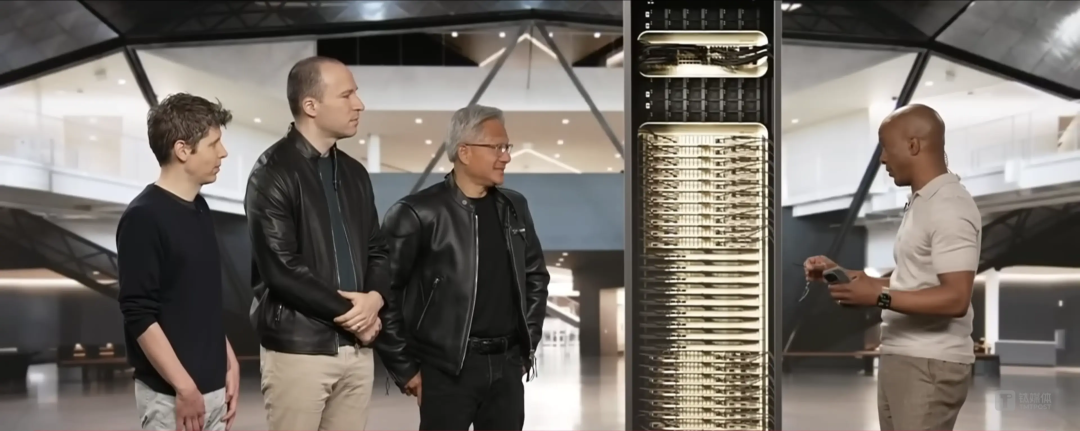
Image source: Internet
The commercialization process indeed faces challenges. Deutsche Bank's latest report reveals that paid user growth for ChatGPT in major European markets has stalled. Despite having 800 million weekly active users, only 20 million are paying users, with no significant growth in consumer spending in the European region since May. This signal suggests that OpenAI may be hitting a ceiling in attracting new paying users.
Emerging from its non-profit halo, OpenAI is being stripped of its idealistic veneer by the harsh realities of commercial laws. Under the dual assault of massive money-burning and revenue pressure, the Atlas browser is not just a product of technological innovation but also a strategic trump card that the company must play amid its transformation pains.
It must not only seize critical ground in the survival battle of the AI era but also prove its commercial value in the fiercely competitive market.
The curtain has just risen, but the time Leave it to (left for) OpenAI to make mistakes is already running out.
References:
1. 'OpenAI Releases AI Browser, Google's Stock Price Drops' Jiemian News
2. 'OpenAI Atlas Test Report' Lang Hanwei (Will)
3. 'Major Applications Launch Intensively, Simultaneously 'Challenging' Google, Amazon, and Meta! Is OpenAI in a Hurry? It Plans to 'Burn' $8.5 Billion This Year' National Business Daily








